Travels with Marwan: End of Week 2
Nebbi, Kampala
With the last of the healt h center site visits behind us, our time in Uganda seemed to suddenly speed towards the end.
On Wednesday, we arose at the usual time in the morning, ate some breakfast, and checked out of the hotel, all our bags placed in the van much as they were piled in on our journey here to Arua. This time we were heading back to Kampala.
First, we had two more meetings in Nebbi.
Today was the monthly Nebbi district meeting the Ministry of Health holds for their National Quality Improvement (QI) initiative. Not only will the district QI officers and implementing partners be there but we were going to see clinical staff from all 5 sites we visited come and present on their projects they have been working on to improve viral load suppression.
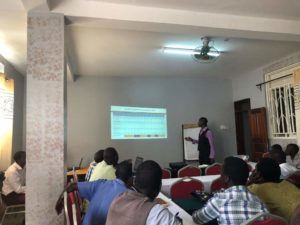 We arrived earlier than the site teams, having taken what by now has become the very familiar road to Nebbi for the last time. While waiting, we decided to have a cup of coffee in the open air cafeteria of the small bungalow-style hotel the meeting was being held at. As the vans arrived from the various sites bringing the QI teams, we saw the site staff come through the cafeteria to get to the meeting room. At first glance, as they entered, we did not recognize them out of their clinic uniforms. Seeing them come up to us and greet us warmly with big smiles on their faces, however, reassured us that despite having spent only a few hours with each of them, there was a bond that formed in that short period of time. I felt my whole body beam as we greeted each other.
We arrived earlier than the site teams, having taken what by now has become the very familiar road to Nebbi for the last time. While waiting, we decided to have a cup of coffee in the open air cafeteria of the small bungalow-style hotel the meeting was being held at. As the vans arrived from the various sites bringing the QI teams, we saw the site staff come through the cafeteria to get to the meeting room. At first glance, as they entered, we did not recognize them out of their clinic uniforms. Seeing them come up to us and greet us warmly with big smiles on their faces, however, reassured us that despite having spent only a few hours with each of them, there was a bond that formed in that short period of time. I felt my whole body beam as we greeted each other.
For that morning, we listened to each of our teams give updates on their QI projects. They have all just recently launched their QI programs and were presenting on their 3 month progress. Again, similarities rang truer than the differences as we were reminded of the intense QI work we do at our health center sites: the ground rules, the flow charts, the project aims, and the root cause analyses.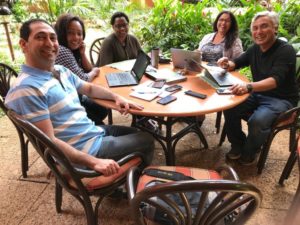
We had to leave in the early afternoon since we still needed to have our final debrief with the implementing partner, Infectious Diseases Institute (IDI), before we headed back to Kampala in hopes of minimizing the amount of time we would be on the road at night.
As we left the QI meeting, the teams and staff said their farewells, sending us off with their synchronous clapping which had a wonderful, energizing beat that lifted our mood. We were leaving after an intense time spent immersed in listening, connecting, discussing, learning, and planning what seemed to be every waking hour of our days with the express purpose to achieve the goals of improving viral load suppression rates for each site and for the Nebbi district as a whole. The percussive, upbeat send-off came as a surprise and elicited huge smiles and laughs from us and filled the room with optimism and hope, reassuring us that this was indeed the start, not the end.
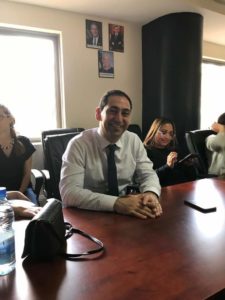 We met with the IDI team whom we have grown to know well by now. We sat around a table at their offices and summarized our findings, which they had heard in more detail when we debriefed with the sites after each visit. We will be working very closely with them over the coming months since they are the partners on the ground who will have to lead many of the initiatives in Nebbi to get to the target viral load suppression rates Uganda is wanting to reach.
We met with the IDI team whom we have grown to know well by now. We sat around a table at their offices and summarized our findings, which they had heard in more detail when we debriefed with the sites after each visit. We will be working very closely with them over the coming months since they are the partners on the ground who will have to lead many of the initiatives in Nebbi to get to the target viral load suppression rates Uganda is wanting to reach.
The idea is that we would be meeting with the health center site teams virtually through WhatsApp and Zoom platforms on an ongoing basis for the next 3-4 months and then return for a second site visit in late August or September. WhatsApp is the platform most of the world tends to use but does not seem to be as known or as popular in the U.S. With a wireless connection, you could make phone calls and “facetime” through the App as well as create groups and communicate through chats. Zoom is the popular platform that is used to conduct meetings virtually, through videoconferencing, but is easy enough to use on computers, smartphones, and tablets. Zoom is the platform we have been using for many years at Community Health Center, Inc. (CHCI) for our virtual meetings throughout the agency as well as for the many virtual, long distance learning we provide across CHCI, our state, and the nation.
As we were discussing the next steps with each site, it became quickly obvious that most of the sites did not have the technical capabilities yet. Very few staff members had smartphones. There was limited access to a computer. And many of the sites did not have internet connection or had a very poor signal. The first action item for IDI will be to ensure that each site is set up with internet access (can be done through hot spots) and that each site has a device that they can use to connect, be it a smartphone or computer. They reassured us this will be done by next week. We left cautiously optimistic that this might actually happen, if not within a week, hopefully relatively soon given the short timeline.
We were on the road back to Kampala by 3 pm. We all were dreading it would take the 10 and a half hours it took coming to Arua. We reassured each other that this time we are starting from Nebbi which is 1 1/2 hours closer. We also kept our eye on the prize: Hotel Serena. “Tonight, we will sleep well”, we bolstered each other. 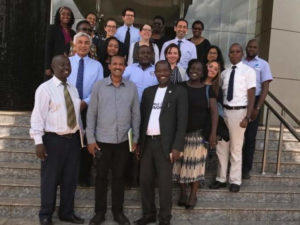 The drive went quite smoothly until the sun set and the roads went dark. We now experienced firsthand the reasons why we were told not to be on the road after dusk if you could avoid it. During the last two hours of the trip, as we entered the outskirts of Kampala, the dimly lit two lanes of road seemed to become six lanes. First, there were lanes of people walking along each side of the road, some deciding last minute to cross over to the other side for one reason or another. There were also newly formed lanes on both sides of bicycles, motorcycles, and boda bodas (Uber-like motorcycles) piled with people carrying a myriad of things, weaving between the pedestrians and the cars. Lastly, there were the two lanes of vehicles going in opposite directions consisting of cars, vans, and huge trucks, each vehicle trying to pass the one ahead of it and playing a game of chicken with the cars coming head on. This chaos persisted for what seemed like forever when we finally saw the familiar compound of the hotel and we all let out a huge sigh of relief.
The drive went quite smoothly until the sun set and the roads went dark. We now experienced firsthand the reasons why we were told not to be on the road after dusk if you could avoid it. During the last two hours of the trip, as we entered the outskirts of Kampala, the dimly lit two lanes of road seemed to become six lanes. First, there were lanes of people walking along each side of the road, some deciding last minute to cross over to the other side for one reason or another. There were also newly formed lanes on both sides of bicycles, motorcycles, and boda bodas (Uber-like motorcycles) piled with people carrying a myriad of things, weaving between the pedestrians and the cars. Lastly, there were the two lanes of vehicles going in opposite directions consisting of cars, vans, and huge trucks, each vehicle trying to pass the one ahead of it and playing a game of chicken with the cars coming head on. This chaos persisted for what seemed like forever when we finally saw the familiar compound of the hotel and we all let out a huge sigh of relief.
As we pulled into the driveway and the Nebbi team began to unload, I felt an unexpected longing to be back in Nebbi for one more day. I was going to miss being with this team exclusively, bonding over what had become a familiar adversity as we focused solely on our shared mission.
Yet, it was time.
 We were going to rest really well tonight and wake up in the morning to greet the two other teams who were coming back from their districts and we were going to share stories and prepare our presentations for the final debrief to the Ministry of Health on Friday. We checked in and each retreated to our grand rooms, exhausted. All of us I think took a long, hot shower or bath. Some ordered room service; some crawled right into what now felt like the most luxurious bed in the world.
We were going to rest really well tonight and wake up in the morning to greet the two other teams who were coming back from their districts and we were going to share stories and prepare our presentations for the final debrief to the Ministry of Health on Friday. We checked in and each retreated to our grand rooms, exhausted. All of us I think took a long, hot shower or bath. Some ordered room service; some crawled right into what now felt like the most luxurious bed in the world.
Throughout the next day, we stayed at the hotel preparing our final debriefs and slides for the Ministry, happy to sit in the restaurant garden together and order meals and coffee or tea as we worked. By late afternoon, the other teams began trickling in and we recognized in their faces what we must have looked like when we arrived. Everyone was exhausted, happy to be back at this hotel in Kampala, and yet exhilarated at the experiences and the work that had unfolded over the last 2 weeks.
We all had dinner together, sharing our stories, relaxing for a few hours prior to us all opening up our computers at the table and finalizing our slides for tomorrow morning. Not surprisingly, very similar themes ran through our narratives. Yet, each district had unique challenges that we needed to make sure to emphasize as well.
We said our good nights knowing that tomorrow after the visit to the Ministry of Health, this incredible team will begin to disband.
The meeting with the Ministry went well. We were most encouraged that our implementing partners were vocal in advocating for change based on the many conversations we had and what they observed over the last 2 weeks. We knew we needed each other—they needed our support and guidance if this project was going to succeed and we needed them to ensure that progress would happen on the ground.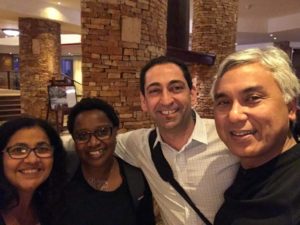
And then the goodbyes began. Some of us left that night, others were leaving the next day. Each one of us had a very long journey ahead (close to 24 hours for most of us) to get back to our respective homes, families, jobs, and lives. These past 2 weeks were a mix of hope and frustration, thrills and sadness, and exhilaration and exhaustion. As we boarded our planes to fly back home, we bid adieu to the open skys, lush vegetation, and beautiful smiles of a resilient people, embracing the bittersweet ending to a grueling yet transformative experience. As we took off into the warm night sky riddled with stars, we looked to the future and thought to ourselves reassuringly: ‘Farewell, Uganda. Til the next time’.